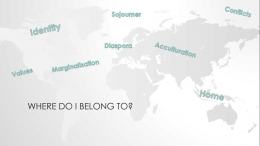Jakarta, mid 2016. It was a (normally) heated afternoon when I was walking in a busy road in Jakarta. There was this common scene: awful traffic congestion where drivers honked their horn loudly and motorcyclists occupied the pavement. 'frustrated' was the only word I could think of to describe how I felt.
Jakarta, mid 2016. It also marked a few months after I came back from studying abroad in England for a year. A few baffling, bizarre months when I struggled much to stand on the ground, on my own land. There were inner conflicts that I barely understood, and I couldn't find the answers right away. To see people innocently cut the line or fight to get into the trains and neglect the disembarking passengers. Frustrating, how frustrating.
The struggle is sometimes taken for granted - the struggle that people who come back to their homeland from living abroad are facing. The confusion, the frustration. I have felt that the values I learned and absorbed when I was away greatly confront the values of my homeland. I managed it quite well when adjusting to the new systems when I was abroad. But the struggle is more real and peculiar when I came back to Indonesia. The country where I was born and raised. My home, where I have spent most of my life. Why is that even possible? I blame myself that I immersed too much in the diaspora.
It may not be fully legitimate to claim that I have double identity, as I was only away from my homeland for 2 years in total (14 months in the UK and 10 months in the US). The term 'double identity' might only fit to those who have migrated to a new country for quite a long time. Still, the confronting values have left me cramped, as I try to reconstruct my true identity, of who I really am, of which values I should hold.
To help explain the conflicts, allow me to use Geert Hofstede's cultural dimensions and the culture compass to highlight the differences between Indonesian values and those I learned when I was away.
- Power distance and indulgence
I was raised in a society where I always had to say 'yes' to any command or request from the older or people who have more power. There is almost no room to criticise -- there is no room to say "no" or refuse something even though I don't like it. Parents and teachers were always right. Dare to challenge them, most likely you'd be in a huge trouble. As the result, I had an 'unquestioning mind' -- my critical thinking skills had long been imprisoned. Fighting for what I wanted was somewhat wrong. My happiness was restrained and defined by other people - I wasn't allowed to 'indulge' myself.
The first struggle was so real when I started my Master's study in the UK. I was unable to write a decent essay assignment as my critical thinking skills were yet to develop. But then I learned from the people I interacted with that it is okay to say 'no' if that means 'no'. As I talked to and had discussion with more people, I learned to see things from different angles, to voice my disagreement towards unfairness or injustice and to fix the wrong. I learned that each of us has equal power to speak our mind.
But then I faced a greater struggle when I came back to Indonesia. I had to, yes I had to return to the old system where a room for critiques is very limited. Again, I am not allowed to voice my disagreement or my true opinion. Many times I have been upset to see unfairness or injustice ruled by people who have more power. Yet I cannot disagree with it. I just cannot.
- Individualism
I used to depend so much on other people -- my family, my friends. I must share everything, every single aspect of my life with other people. People around me always wanted to know everything about me -- what I was doing, where I was heading or who I was with. I was living in a collectivist society.
Then I learned that myself, my own happiness matters. That I should be assertive. I should care about myself as much as I care about other people. I used to always put other people before me. But then I realised I would never be happy if I kept doing that. So I was happy for a while (when I was abroad). Nobody minded what I was doing -- nobody judged.
A disaster came when I was back to my homeland. People care so much for me -- sometimes too much until they make me feel uncomfortable. I am judged by what I do, even though it doesn't give direct impact to other people. They mind, they mind my business so much.







